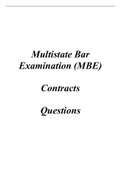Multistate Bar
Examination (MBE)
Contracts
Questions
, Multistate Bar Examination (MBE) – Contracts – Questions
Question 1
On July 15, in a writing signed by both parties, Fixtures, Inc., agreed to deliver to Druggist on
August 15 five storage cabinets from inventory for a total price of $5,000 to be paid on delivery.
On August 1, the two parties orally agreed to postpone the delivery date to August 20. On
August 20, Fixtures tendered the cabinets to Druggist, who refused to accept or pay for them
on the ground that they were not tendered on August 15, even though they otherwise met the
contract specifications.
Assuming that all appropriate defenses are seasonably raised, will Fixtures succeed in an action
against Druggist for breach of contract?
(A) Yes, because neither the July 15 agreement nor the August 1 agreement was required to be
in writing.
(B) Yes, because the August 1 agreement operated as a waiver of the August 15 delivery term.
(C) No, because there was no consideration to support the August 1 agreement.
(D) No, because the parol evidence rule will prevent proof of the August 1 agreement.
1
, Multistate Bar Examination (MBE) – Contracts – Questions
Question 2
By the terms of a written contract signed by both parties on January 15, M.B. Ram, Inc., agreed
to sell a specific ICB personal computer to Marilyn Materboard for $3,000, and Materboard
agreed to pick up and pay for the computer at Ram's store on February 1. Materboard
unjustifiably repudiated on February 1. Without notifying Materboard, Ram subsequently sold
at private sale the same specific computer to Byte, who paid the same price ($3,000) in cash.
The ICB is a popular product. Ram can buy from the manufacturer more units than it can sell
at retail.
If Ram sues Materboard for breach of contract, Ram will probably recover
(A) nothing, because it received a price on resale equal to the contract price that Materboard
had agreed to pay.
(B) nothing, because Ram failed to give Materboard proper notice of Ram's intention to resell.
(C) Ram's anticipated profit on the sale to Materboard plus incidental damages, if any, because
Ram lost that sale.
(D) $3,000 (the contract price), because Materboard intentionally breached the contract by
repudiation.
2
, Multistate Bar Examination (MBE) – Contracts – Questions
Question 3
In a single writing, Painter contracted with Farmer to paint three identical barns on her rural
estate for $2,000 each. The contract provided for Farmer's payment of $6,000 upon Painter's
completion of the work on all three barns. Painter did not ask for any payment when the first
barn was completely painted, but she demanded $4,000 after painting the second barn.
Is Farmer obligated to make the $4,000 payment?
(A) No, because Farmer has no duty under the contract to pay anything to Painter until all three
barns have been painted.
(B) No, because Painter waived her right, if any, to payment on a per-barn basis by failing to
demand $2,000 upon completion of the first barn.
(C) Yes, because the contract is divisible.
(D) Yes, because Painter has substantially performed the entire contract.
3




